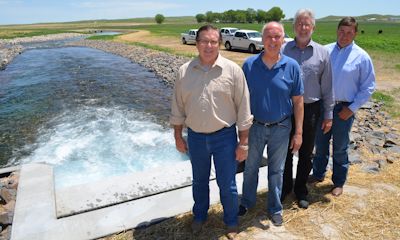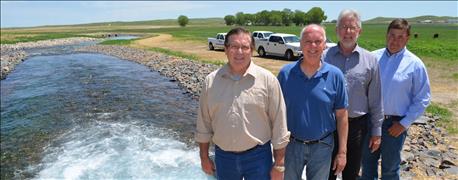
This article is the first in a two part series on augmentation projects on Republican River

RUNNING WATER: Jack Russell, manager, Middle Republican NRD (left); Mike Clements, manager, Lower Republican NRD; Kent Miller, manager, Twin Platte NRD; and Jasper Fanning, manager, Upper Republican NRD (right) stand in the discharge area of the NCORPE project where water flows into Medicine Creek, a tributary of the Republican River. Photo courtesy of Upper Republican NRD.
Innovative stream flow augmentation projects along the Republic River Basin have prevented major irrigation well shutdown in south central and southwest Nebraska. The projects, coordinated by Natural Resources Districts in the Basin including the Upper Republican, Middle Republican and Lower Republican NRDs, increase stream flow by up to 80 cubic feet per second and take some irrigated land out of production. Irrigation well water on those formerly irrigated properties is then pumped into the river or a tributary of the river, to increase stream flow into Kansas and satisfy Republican River Compact requirements for Nebraska.
"The Rock Creek augmentation project in Dundy County and the Nebraska Cooperative Republican Platte Enhancement augmentation project in Lincoln County have kept the State of Nebraska in compliance with the Republican River Compact in 2013, 2014, 2015 and will do so again in 2016," says Nate Jenkins, Upper Republican NRD assistant manager in Imperial. "The projects have produced the intended results because they have maintained compliance with the Compact in a manner that prevented catastrophic economic consequences in Nebraska's portion of the Republican Basin."
According to Jenkins, after completion in early 2013, the Rock Creek project prevented an irrigation shutdown on about 23,000 acres in the Upper Republican NRD that same year. With the NCORPE project completed in early 2014, the projects combined that year to prevent irrigation shutdown on about 300,000 acres, or almost one third of all irrigated acres in Nebraska's Republican Basin. In 2015, the Rock Creek project wasn't used, but the NCORPE project prevented shutdown on another 300,000 acres.
Jenkins says that producers in the Republican Basin received more good news with a favorable U.S. Supreme Court ruling in early 2015 along with an agreement among Compact states of Nebraska, Kansas and Colorado. "These will both reduce the amount of augmentation water NRDs will have to produce in 2016 and give more flexibility relative to when it is provided, and help ensure it is available to be beneficially used by surface water users," Jenkins says.
Prior to the new agreement between Compact states, Nebraska received just 54% credit for water pumped at the NCORPE project. In other words, for every two acre-feet of water that had to be pumped, the state only received credit for one acre-foot. "Now, Nebraska receives 100% credit," Jenkins explains. "Combined, the accounting change approved by the Supreme Court and the agreement among the Compact states will reduce augmentation pumping substantially without negative consequences for downstream water users." A bonus is flexibility in the agreement giving NRDs more time to provide augmented stream flow and volumes of water may adjust based on changing conditions throughout the year, he adds.
Learn more about why augmentation projects are being used in part two of this Nebraska Farmer series on the Republican River Compact. You can contact Jenkins at 308-882-5173.
About the Author(s)
You May Also Like






